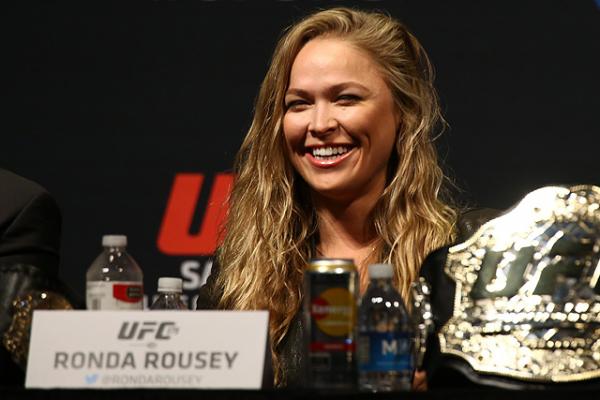Book Review: Ronda Rousey’s ‘My Fight/Your Fight’

Ronda Rousey’s road to the top was not without its bumps. |
Photo: Dave Mandel/Sherdog.com
There may be no character more polarizing for mixed martial arts fans than Ronda Rousey. The undefeated Ultimate Fighting Championship women’s bantamweight titleholder embodies a love-me-or-hate-me shoulder shrug, her overwhelming sense of purpose and self-belief buoying her to unprecedented success in the midst of resounding boos and cheers -- reactions she readily expects, embraces and dismisses.
This dichotomy is on full display in “My Fight/Your Fight,” an unflinching look at the personal and professional highs and lows of the MMA starlet. Alongside award-winning journalist Maria Burns Ortiz, who also happens to be the champion’s sister, Rousey details the good, the bad and the ugly without blinking an eye. Though Ortiz clearly brings the writing chops, penning a highly readable book without diluting the content, the voice is unmistakably charged with Rousey’s trademark cavalier charm and candid sass. It is this ability to cut through the noise that allows Rousey to open the old closet and dust off whatever she finds there, including stories of failed relationships, the hollow sense of happiness after medaling at the Olympics and even an STD scare.
Advertisement
In these moments of vulnerability, the soul of the book -- and the woman behind it -- finds its lungs. From the outside looking in, Rousey’s career has been a one-way ascending escalator to MMA monarchy. In reality, her success was largely forged out of missteps and detours, marked with tear-soaked gis and burned bridges. Yet through the chaos, including one of the worst single days anyone could possibly have, Rousey is an unabashed believer in destiny, retrospectively dissecting tragedies to find the seams of greatness between the loneliness and frustration she experienced at the time.
This is not to say the book is perfect.
Each chapter begins with a monologue from Rousey in the present, a brief raising of the periscope to survey the slipstream behind her before retracting for a dive back into her past. Truth be told, the book would have been better off without these half-spoiler alerts/half-motivational poster captions. The monologues almost uniformly arrive at some sort of clichéd truism, but even the exceptional cases of genuine insight are inherently less interesting than the actual episodes from her life. The platitudinous conclusions -- and there are many -- seem greased up to fit into a contrived notion that Rousey’s journey to success is really no different than the Average Joe’s. It is a noble attempt to bridge the gap between the champ and the readers through Venn Diagram logic, but the problem is that she is not like the rest of us; and she is the better for it. Fans and detractors alike revel in their feelings towards Rousey, not because she is relatable but because she is a fascinating hyperbole. That is why the best moments in the book stem from narrative depictions from inside Rousey’s head; it is the difference between watching a movie and having someone give you a play-by-play.
Then there are the moments where Rousey indulges in her unmuzzled position as the Victor from the Mountaintop, recounting more than one of her judo losses conspiratorially -- the phrase “she knew she lost” makes several cameos -- and giving a particular ex-boyfriend the hilariously puerile nom de plume “Dick Ittybitty.” Verisimilitude be damned, this is her memoir. Why wouldn’t she include some personal barbs?
The jabs do not stop there, either. If you are familiar with her public persona, you will no doubt find peripherally written slights to the usual suspects. There is an entire chapter titled, “You Will Never Win a Fight by Running Away,” in which she likens point fighting to “fighting a lawyer.” (Cough, Floyd Mayweather Jr.). In another section, she describes the first time she watched a women’s MMA fight with a group of men, relishing the fact that “the [female fighters] were beautiful, yes, but the guys didn’t talk about them like they did the ring girls … who they talked about as if they were strippers.” (Cough, Arianny Celeste.) Of course, there is the obligatory steroid commentary: “The one thing they couldn’t inject into their asses is belief.” (Cough, Cristiane Justino.)
Overall, “My Fight/Your Fight” is a compelling glimpse into the mind and the mirror of MMA’s most-wanted woman, though not without its share of minor flaws. Still, an unapologetic honesty permeates the book. As a memoir, the reader can no doubt feel Rousey’s moments of catharsis in writing this; one gets the sense that she spent so much time trudging through the trenches, it must have been liberating to come up for air, see how far she has come and put her story in open space. Existing fans of Rousey will discover new reasons and reminders to fortify their support, and open-minded naysayers may even flirt with a change of heart. If not, it won’t bother Rousey much. She has made it through much worse, and look where she is now.
« Previous Book Review: Bruce Buffer, ‘It’s Time’
Next Book Review: Justin Wren’s ‘Fight for the Forgotten’ »
More




 Book Review
Book Review

